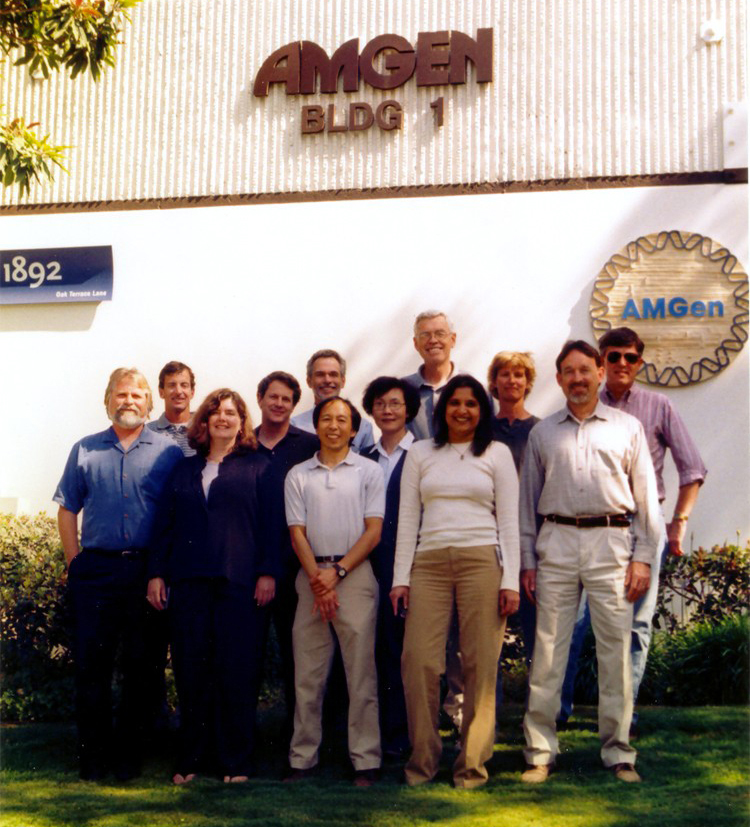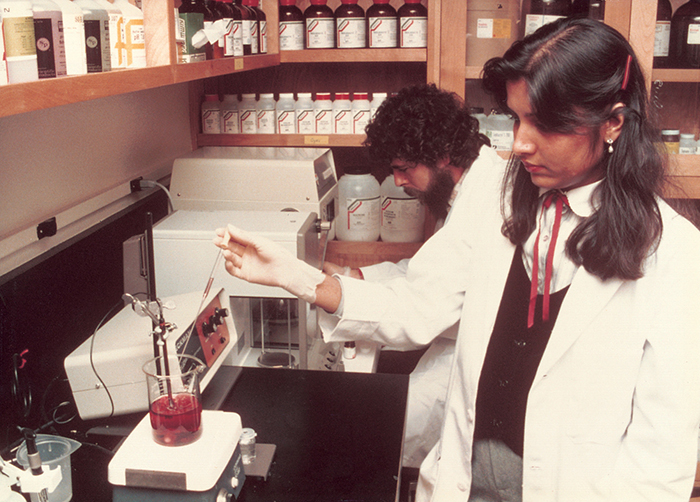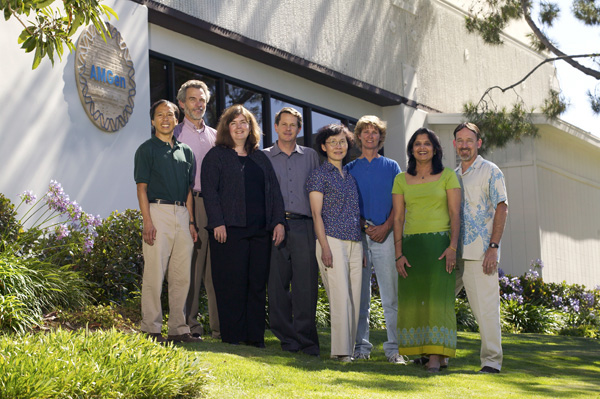It was supposed to be a temporary gig.
Avantika Patel was 25, newly married and still learning how to speak English after arriving in Southern California from a small town in India. Her husband was working as an engineer, she had a degree in microbiology and a plan to attend graduate school.
“They had those classified ads back then and my husband pointed one out,” she said. “He said: ‘Do you know this place in Thousand Oaks – Applied Molecular Genetics?’”
She didn’t.
Applied Molecular Genetics had just started the prior year with George Rathmann as the chief executive officer and had just three staff members. When she went for the interview at the small, modest building in the Spring of 1982, there were barely two dozen. She said it went well, but then she didn’t hear from the company for months.
Patel didn’t think much more about the job.
But Applied Molecular Genetics had been thinking about her and contacted Patel in November. They asked if she’d like to work as a research associate. She was already working at Jafra Cosmetics and the new job meant a pay cut of a few thousand dollars. But it looked interesting and exciting and it seemed to mesh with her graduate school goal.
Patel decided to give it a chance. A year turned into five. She had her first child. Five turned into 10 and she soon had a second child. The company was also growing. Fifty staff. Then 150. Then about a thousand. A first major drug to reach market that treated kidney disease exploded the company onto the map. Then came a cancer-related drug in 1992. Staff grew to 2,500. Money wasn’t an issue anymore with early stock shares and several splits since.
By now the company was known as Amgen. Patel was making a name for herself with a straightforward, no-nonsense approach to the job and becoming an invaluable asset in learning how to guide drugs through the rigorous U.S. Food and Drug Administration approval process. The temporary job she’d applied to a decade prior was becoming a permanent part of her life.

Avantika Patel, second from the right, pictured in front of the building she began working in 39 years ago. She retired this year as Amgen's longest-tenured employee. Amgen file photo.
For the next three decades, she would help steer three major drugs to market, become a go-to person to salvage drug studies that were off-track and become a mentor and friend to what she called “my Amgen family.”
But that ended Jan. 29, when Patel retired as the longest-serving staff member at Amgen.
“It was the hardest decision I’ve ever made,” she said.
A Passage from India
Patel was the daughter of a coal mine owner and a housewife, who married at 18. Neither had finished college. The town she grew up in was small and had limited options for a girl who had a keen love of science - specifically microbiology.
She left home at 16 to study, ultimately obtaining a degree in microbiology and with thoughts that she would put her education to work in India. But she was also part of traditional Indian culture and had an arranged marriage that set her up with a man who was already in the United States studying engineering at Fairleigh Dickinson University in New Jersey.
As he moved to Southern California for a job, she left India to be with him. A new husband. A new country. A new life.
“It was difficult,” she said. “I was a girl who came from a small town in India where women were not highly educated. I thought I would never know my potential without furthering my education. But being at Amgen, I learned how to overcome my fears and be self-taught.”
Her husband, Chandrakant Patel, said she was driven to learn and work. “I didn’t know much about genetics, but it was all she talked about – genetics, genetics, genetics. I knew she was going to get into it somehow and be successful.”

Avantika Patel works in the lab in her first year at Amgen. Amgen file photo.
Working in clinical trials and cutting-edge studies, the plan of getting a doctorate couldn’t compete with what she was learning at Amgen – while helping her balance raising a family. Amgen was with her along the way – as her son was one of the first to stay at Amgen’s new childcare center in 1993 – known as Camp Amgen. She celebrated birthdays, anniversaries and the birth of her second son in that first decade.
Besides, the work at Amgen had become personal in another way.
She was beginning her own battle with kidney disease.
Scientist and Patient
Patel said her mother had kidney disease and it wasn’t shocking to her that she developed it as well. In 2003, her doctor put her on a drug she had worked on at Amgen before it went to market in 1989.
The study was personal to her – both from her own health and from what had happened with her mother. She said the importance of scientific advancements are driven by empathy and a desire to ease suffering of others.
She was put on an organ transplant list. But being O positive meant the wait could be long due to its commonality.
Deb Lium, who began working with Patel in 2000, said she knew about a year before Patel started dialysis that things were rough for her.
“I remember she would leave during the day sometimes because she was in pain,” Lium said. “But she is so strong and the work is so important to her, she couldn’t stop. It’s just who she is.”
The dialysis treatments began in 2009 and the routine was brutal.
Three days a week, Patel would get up early to be at work by 7 a.m. She would leave work around 4 p.m. to make a half-hour drive to Simi Valley for dialysis. She remembered the big needle to take blood out. There were excruciating cramps in her body. She said sometimes she would scream and cry from the pain.
“She was tired and exhausted, but she was tough,” Chandrakant said. “She wouldn’t complain, either.”
But then she’d be at work the next morning. Sometimes, when she’d travel for work, she would find a dialysis center in the city she was at just so it wouldn’t interrupt her work.
“She always kept the pain to herself,” Lium said. “But I could tell sometimes it was hard for her.”
Then Patel got the call in 2014. There was a kidney available. Dialysis would mercifully be over.
Her husband said he remembered the call. He was driving home from work and she had arrived home before him. The phone rang and she answered and got the news and immediately called him while he was in the car.
“I remember she said it was a perfect match,” Chandrakant Patel said. “I drove home as fast as I could. We were so excited.”
Patel got the transplant a few hours later.
She struggled with sepsis for the first year, but as the kidney settled into its new home, it adapted and she continued to work.
“After the surgery, you realize how fragile life is,” Patel said. “Mentally, I’m a strong person so the physical discomfort didn’t bother me as much. I could distract myself from it by diving into the work. But I also noticed I didn’t have as much energy as I used to and so I started to think about leaving.”
Long Legacy
When Patel told Maryam Huber she was contemplating retirement, Huber wasn’t surprised. She had known the physical toll of the kidney disease and the dialysis and surgery for the transplant had taken a cumulative toll on her.
Huber, who has known her for more than 15 years, said Amgen is losing a library of institutional knowledge and one of the most empathetic workers she has ever known – even though she could be abrupt and blunt with her pragmatism at the same time. She has helped see several major Amgen drugs come to market.
“It was all in service to get help to patients,” Huber said. “She knew getting the job done meant helping people. She didn’t want to waste time.”

From a 2005 Amgen file photo featuring the longest-tenured staff in front of Building 1, displaying the original Amgen logo. Avantika Patel is second from the right.
Patel said she knows she will have a lot more time on her hands once she leaves Amgen.
Susan Cupples, who is close to Patel and was at her son’s baby shower 20 years ago, laughed when she thought about Patel spending time on a beach relaxing or sitting around doing nothing. “She needs a purpose and I think she will find it.”
Patel said Amgen was “my second family.” It was only the second employer she ever worked for and she said she gave it all she had. She said Amgen had returned the favor many times over and she can’t imagine a better 39 years.
But she said she will probably do volunteer work involving clinical research. She will have more time to dote on her grandchildren and be with her family. She said she will miss Amgen terribly.
“I stayed because this is what I was meant to do and I loved what I did here,” Patel said. “I worked as long as I could, but it finally was time to leave.”
And so, she will. After a long, temporary 39 years.

Avantika Patel retired from Amgen after working with the company for 39 years and was its longest-tenured employee, coming on board just one year after it was founded in 1980. Photo: Stacey Gleason.





